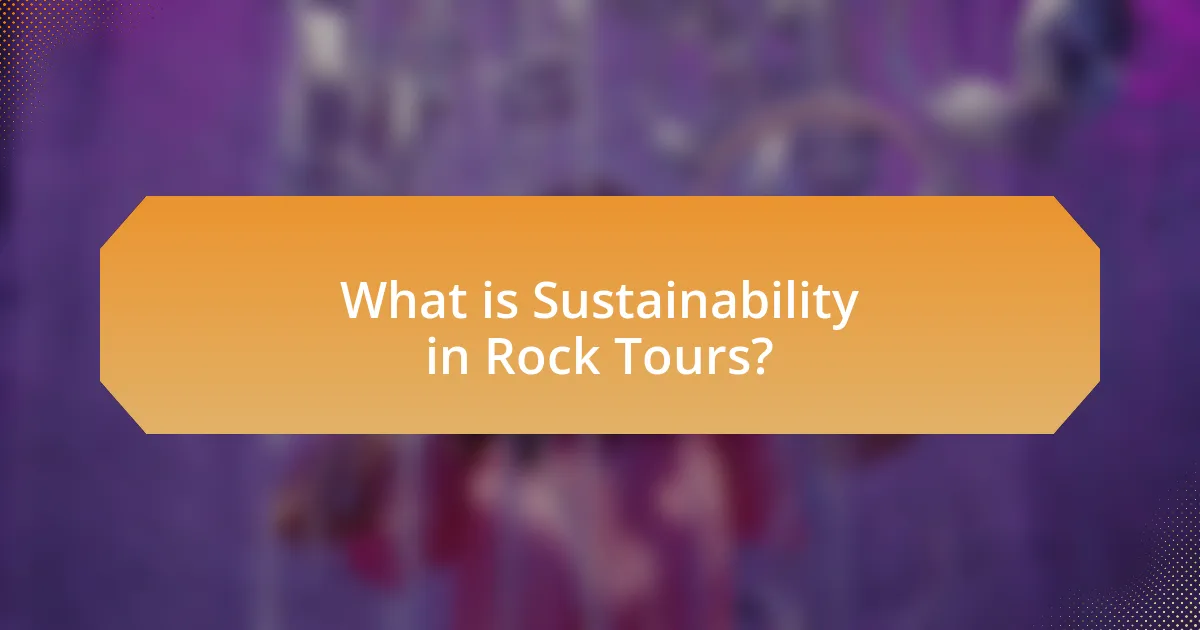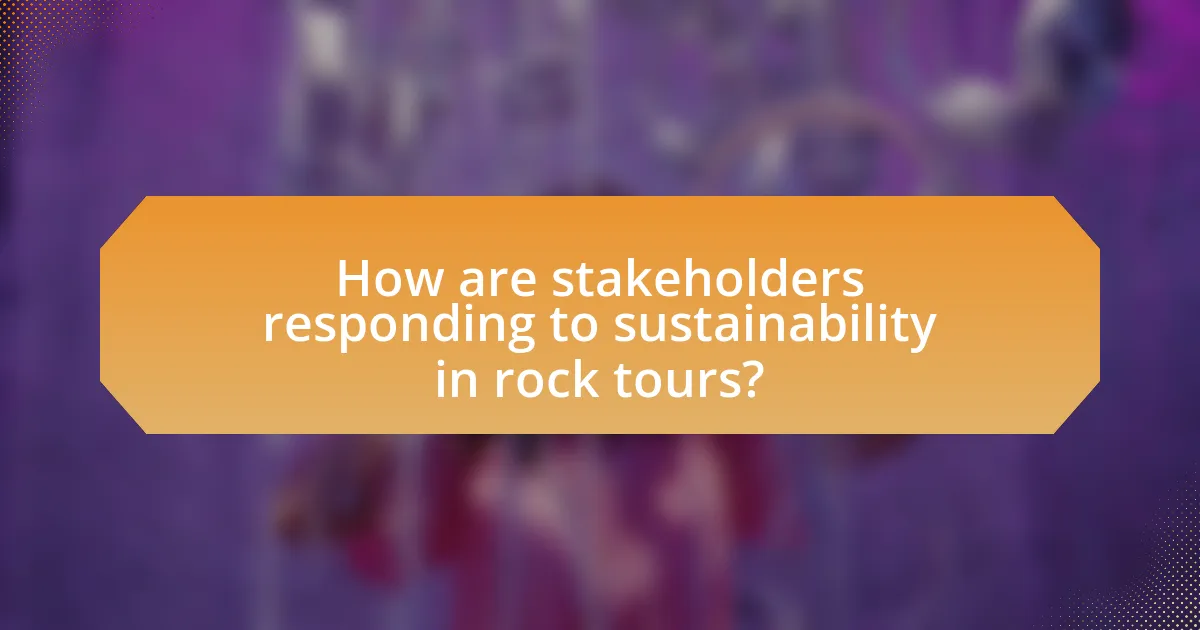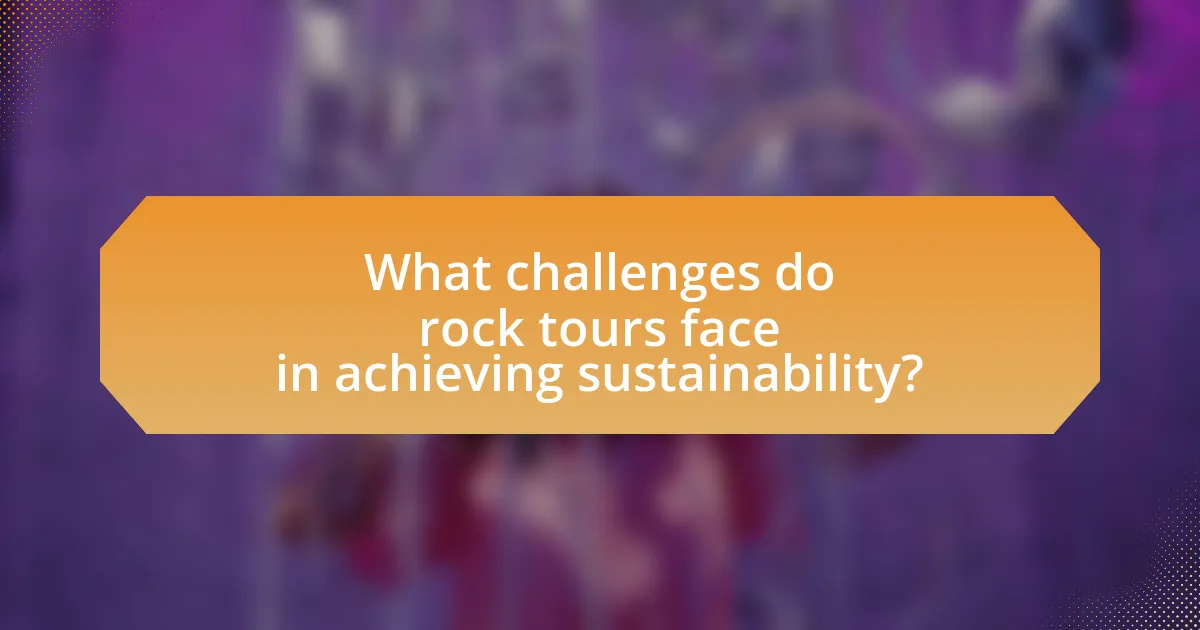Sustainability in rock tours encompasses practices aimed at minimizing environmental impact while enhancing social and economic benefits within the music touring industry. The article explores the definition of sustainability in this context, highlighting key principles such as reducing carbon footprints, promoting resource efficiency, and fostering social responsibility. It discusses current trends, innovations, and the role of artists, fans, and stakeholders in implementing eco-friendly practices. Additionally, the article addresses challenges faced in achieving sustainability, potential solutions, and best practices that can be adopted to promote responsible touring.

What is Sustainability in Rock Tours?
Sustainability in rock tours refers to practices that minimize environmental impact while promoting social and economic benefits within the music touring industry. This includes using eco-friendly transportation, reducing waste through recycling and composting, and sourcing local materials for merchandise and food. For instance, a 2021 report by the Music Industry Sustainability Coalition highlighted that implementing sustainable practices can reduce a tour’s carbon footprint by up to 50%.
How is sustainability defined in the context of rock tours?
Sustainability in the context of rock tours is defined as the practice of minimizing environmental impact while maximizing social and economic benefits during the planning and execution of music tours. This includes implementing measures such as reducing carbon emissions through eco-friendly transportation, utilizing renewable energy sources at venues, and promoting waste reduction and recycling initiatives. For example, a study by the University of Colorado found that concert tours can produce significant carbon footprints, prompting many artists and promoters to adopt sustainable practices, such as using biodiesel for tour buses and partnering with local organizations to offset emissions.
What are the key principles of sustainability relevant to the music industry?
The key principles of sustainability relevant to the music industry include reducing carbon footprints, promoting resource efficiency, and fostering social responsibility. Reducing carbon footprints involves minimizing greenhouse gas emissions through eco-friendly touring practices, such as using renewable energy sources and optimizing transportation logistics. Promoting resource efficiency focuses on reducing waste and conserving materials, which can be achieved by utilizing sustainable merchandise and recycling materials used in concerts. Fostering social responsibility emphasizes the importance of ethical practices, including fair labor conditions and community engagement, ensuring that the music industry contributes positively to society. These principles are increasingly adopted by artists and organizations, reflecting a growing commitment to environmental and social sustainability within the music sector.
Why is sustainability important for rock tours specifically?
Sustainability is important for rock tours specifically because it minimizes environmental impact and promotes social responsibility within the music industry. Rock tours often involve large-scale logistics, including transportation, energy consumption, and waste generation, which can significantly contribute to carbon emissions and ecological degradation. For instance, a 2019 study by Julie’s Bicycle found that the average concert generates approximately 200 tons of CO2 emissions, highlighting the urgent need for sustainable practices. Implementing eco-friendly measures, such as using renewable energy sources, reducing single-use plastics, and promoting local sourcing, not only helps mitigate these impacts but also enhances the reputation of artists and venues among environmentally conscious fans.
What are the current trends in sustainable rock tours?
Current trends in sustainable rock tours include the use of renewable energy sources, waste reduction initiatives, and eco-friendly merchandise. Many artists and tour organizers are now prioritizing solar and wind energy to power their events, significantly reducing carbon footprints. Additionally, initiatives such as eliminating single-use plastics and implementing recycling programs are becoming standard practice. For instance, major tours like those of Coldplay have committed to being carbon neutral, showcasing a growing industry commitment to sustainability. Furthermore, the adoption of sustainable transportation options for both artists and fans, such as electric vehicles and public transport incentives, is increasingly common, reflecting a broader movement towards environmental responsibility in the music industry.
How are artists and bands incorporating sustainability into their tours?
Artists and bands are incorporating sustainability into their tours by implementing eco-friendly practices such as using renewable energy sources, reducing waste, and promoting carbon offset initiatives. For example, many artists now utilize solar panels to power their stage equipment and rely on biodiesel for tour buses, significantly lowering their carbon footprint. Additionally, they are adopting practices like digital ticketing to minimize paper waste and partnering with organizations to plant trees for every ticket sold, effectively offsetting emissions. These efforts reflect a growing trend in the music industry towards environmental responsibility, as evidenced by initiatives from major artists like Coldplay and Billie Eilish, who have publicly committed to sustainable touring practices.
What role do fans play in promoting sustainability during rock tours?
Fans play a crucial role in promoting sustainability during rock tours by actively participating in eco-friendly initiatives and influencing band practices. Their engagement can manifest through support for sustainable merchandise, participation in recycling programs at venues, and advocacy for reduced carbon footprints associated with touring. For instance, a survey by the non-profit organization Reverb found that 70% of concertgoers are more likely to attend events that prioritize sustainability, demonstrating fans’ willingness to support environmentally responsible practices. Additionally, fans often encourage artists to adopt greener touring methods, such as using renewable energy sources and minimizing waste, thereby creating a demand for sustainable options within the music industry.
What innovations are shaping sustainability in rock tours?
Innovations shaping sustainability in rock tours include the use of renewable energy sources, eco-friendly transportation methods, and waste reduction technologies. For instance, many tours are now powered by solar energy, significantly reducing carbon footprints. Additionally, artists and promoters are increasingly opting for electric vehicles and biofuels for tour transportation, which lowers greenhouse gas emissions. Furthermore, advancements in waste management, such as compostable materials and recycling initiatives at venues, contribute to minimizing environmental impact. These practices are supported by industry reports indicating a growing commitment to sustainability among major artists and concert organizers, reflecting a shift towards greener touring methods.
How is technology being utilized to enhance sustainability in touring?
Technology is being utilized to enhance sustainability in touring through the implementation of energy-efficient equipment, digital ticketing systems, and carbon offset programs. Energy-efficient equipment, such as LED lighting and low-energy sound systems, significantly reduces the carbon footprint of concerts and events. Digital ticketing systems minimize paper waste and streamline entry processes, while carbon offset programs allow touring companies to invest in renewable energy projects to counterbalance their emissions. For instance, a study by the International Energy Agency indicates that transitioning to LED lighting can reduce energy consumption by up to 75%, demonstrating the tangible impact of these technologies on sustainability in the touring industry.
What are some examples of eco-friendly practices adopted by rock tours?
Rock tours have adopted several eco-friendly practices, including the use of renewable energy sources, waste reduction initiatives, and sustainable transportation options. For instance, many bands now utilize solar panels to power their equipment during performances, significantly reducing their carbon footprint. Additionally, rock tours often implement recycling programs and encourage fans to bring reusable containers to minimize single-use plastics. Furthermore, some tours collaborate with local public transport systems to promote eco-friendly travel options for attendees, thereby decreasing the overall environmental impact of large gatherings. These practices reflect a growing commitment within the music industry to sustainability and environmental responsibility.

How are stakeholders responding to sustainability in rock tours?
Stakeholders in rock tours are increasingly prioritizing sustainability by implementing eco-friendly practices and reducing carbon footprints. For instance, major artists and promoters are adopting renewable energy sources for concerts, utilizing biodegradable materials for merchandise, and encouraging fans to use public transportation. A notable example is the 2022 tour by Coldplay, which aimed to be the most sustainable tour ever, featuring a commitment to carbon neutrality and the use of solar-powered stages. Additionally, venues are enhancing waste management systems and collaborating with local communities to promote environmental awareness. These actions reflect a growing recognition among stakeholders of the importance of sustainability in the music industry.
What actions are promoters and venues taking to support sustainability?
Promoters and venues are implementing various actions to support sustainability, including adopting renewable energy sources, reducing waste, and promoting eco-friendly transportation options. For instance, many venues are installing solar panels to power their operations, which significantly lowers their carbon footprint. Additionally, promoters are encouraging the use of public transport and carpooling among concert-goers, which helps decrease emissions associated with travel. Furthermore, waste management initiatives, such as recycling programs and the elimination of single-use plastics, are being adopted to minimize environmental impact. These actions reflect a growing commitment within the music industry to prioritize sustainability and reduce ecological harm.
How do partnerships with environmental organizations impact rock tours?
Partnerships with environmental organizations significantly enhance the sustainability of rock tours by implementing eco-friendly practices and raising awareness about environmental issues. These collaborations often lead to the adoption of renewable energy sources, waste reduction strategies, and carbon offset initiatives during tours. For instance, the partnership between the band Coldplay and various environmental groups has resulted in their commitment to using sustainable materials and reducing their carbon footprint, which includes planting trees for every ticket sold. Such initiatives not only minimize the environmental impact of the tours but also engage fans in sustainability efforts, fostering a culture of environmental responsibility within the music industry.
What incentives exist for artists to adopt sustainable practices?
Artists are incentivized to adopt sustainable practices primarily through enhanced public image and consumer demand for eco-friendly initiatives. By implementing sustainable practices, artists can attract environmentally conscious fans, leading to increased ticket sales and merchandise revenue. For instance, a survey by the International Music Summit in 2021 indicated that 70% of music fans prefer to support artists who prioritize sustainability. Additionally, artists may benefit from partnerships with brands that promote sustainability, providing financial support and resources for eco-friendly initiatives. These collaborations can also lead to greater visibility and marketing opportunities, further incentivizing artists to embrace sustainable practices.
How are fans influencing the sustainability movement in rock tours?
Fans are significantly influencing the sustainability movement in rock tours by demanding eco-friendly practices from artists and promoters. This influence is evident as fans increasingly prioritize sustainability, leading to initiatives such as the reduction of single-use plastics at concerts and the promotion of carbon offset programs. For instance, a survey by the Music Industry Research Association found that 70% of concertgoers are more likely to attend events that implement sustainable practices. Additionally, fan-led campaigns have pressured major festivals to adopt greener policies, such as using renewable energy sources and promoting public transportation options. This growing expectation from fans is reshaping how rock tours are organized, pushing the industry towards more sustainable practices.
What initiatives are fans supporting to promote eco-friendly touring?
Fans are supporting initiatives such as carbon offset programs, sustainable merchandise, and waste reduction strategies to promote eco-friendly touring. These initiatives include purchasing carbon offsets to compensate for the emissions generated during tours, advocating for the use of biodegradable or recycled materials in merchandise, and encouraging venues to implement recycling and composting programs. Research indicates that 70% of concertgoers are willing to pay extra for eco-friendly options, demonstrating a strong demand for sustainable practices in the music industry.
How does fan engagement affect the sustainability policies of artists?
Fan engagement significantly influences the sustainability policies of artists by driving demand for eco-friendly practices. When fans express their preferences for sustainable merchandise, waste reduction, and carbon offset initiatives, artists are more likely to adopt these practices to maintain their fan base and enhance their brand image. For instance, a survey by Music Venue Trust found that 70% of concert-goers prefer attending events that prioritize sustainability, prompting artists to implement greener touring strategies. This alignment between fan expectations and artist policies fosters a culture of sustainability within the music industry, encouraging broader adoption of environmentally responsible practices.

What challenges do rock tours face in achieving sustainability?
Rock tours face significant challenges in achieving sustainability, primarily due to high carbon emissions from transportation and energy consumption. The logistics of touring, including the need to transport large equipment and personnel across various locations, contribute to substantial greenhouse gas emissions. For instance, a single concert can generate an estimated 200 tons of CO2, primarily from tour buses and freight trucks. Additionally, the use of non-renewable energy sources for lighting and sound systems exacerbates the environmental impact. Furthermore, waste management poses another challenge, as concerts often produce large amounts of waste, including plastic bottles and food packaging, which are difficult to recycle. These factors collectively hinder the ability of rock tours to implement sustainable practices effectively.
What are the main barriers to implementing sustainable practices in rock tours?
The main barriers to implementing sustainable practices in rock tours include high costs, logistical challenges, and resistance from stakeholders. High costs arise from the need for sustainable materials and technologies, which can exceed traditional options. Logistical challenges involve coordinating eco-friendly transportation and waste management across various venues, complicating tour planning. Resistance from stakeholders, including promoters and fans, often stems from a lack of awareness or prioritization of sustainability, hindering the adoption of greener practices. These barriers collectively impede the transition towards more sustainable rock tours.
How do financial considerations impact sustainability efforts?
Financial considerations significantly impact sustainability efforts by determining the allocation of resources towards environmentally friendly practices. Organizations often prioritize short-term financial gains over long-term sustainability investments due to budget constraints, which can hinder the implementation of sustainable initiatives. For instance, a study by the World Economic Forum found that companies investing in sustainable practices can see a return on investment of up to 20% over time, demonstrating that financial considerations can ultimately align with sustainability goals when properly managed.
What logistical challenges arise when trying to tour sustainably?
Logistical challenges in sustainable touring include the need for eco-friendly transportation, waste management, and sourcing local materials. Eco-friendly transportation often requires the use of electric or hybrid vehicles, which may not be readily available in all locations, complicating travel plans. Waste management becomes a significant issue as tours generate substantial waste, necessitating effective recycling and disposal strategies that can be difficult to implement on the road. Additionally, sourcing local materials for merchandise and catering can be challenging due to availability and cost, impacting the overall sustainability of the tour. These challenges highlight the complexities involved in balancing environmental responsibility with the practicalities of touring.
What are the potential solutions to these challenges?
Potential solutions to the challenges in sustainability in rock tours include implementing eco-friendly practices, utilizing renewable energy sources, and promoting responsible tourism. Eco-friendly practices, such as reducing waste through recycling and composting, can significantly minimize the environmental impact of tours. Utilizing renewable energy sources, like solar or wind power, can reduce carbon footprints associated with transportation and venue operations. Promoting responsible tourism involves educating participants on sustainable behaviors, such as respecting local ecosystems and supporting local economies, which can enhance the overall sustainability of rock tours. These solutions are supported by various studies indicating that sustainable practices can lead to improved environmental outcomes and increased customer satisfaction in the tourism sector.
How can collaboration among stakeholders lead to better sustainability outcomes?
Collaboration among stakeholders can lead to better sustainability outcomes by pooling resources, knowledge, and expertise to address complex environmental challenges. When stakeholders such as tour operators, local communities, environmental organizations, and government agencies work together, they can create comprehensive strategies that enhance resource efficiency and minimize ecological impact. For instance, a study by the United Nations Environment Programme highlights that collaborative initiatives in tourism can reduce carbon emissions by up to 30% through shared transportation and waste management practices. This collective approach not only fosters innovation but also ensures that diverse perspectives are considered, leading to more effective and inclusive sustainability solutions.
What role does education play in overcoming sustainability challenges in rock tours?
Education plays a crucial role in overcoming sustainability challenges in rock tours by equipping stakeholders with the knowledge and skills necessary to implement sustainable practices. Through educational programs, tour operators, musicians, and audiences learn about the environmental impacts of rock tours, such as carbon emissions and waste generation, and how to mitigate these effects. For instance, initiatives like the “Green Music Initiative” provide resources and training on sustainable touring practices, leading to reduced environmental footprints. Furthermore, research indicates that informed audiences are more likely to support eco-friendly initiatives, thereby driving demand for sustainable options in the music industry.
What best practices can be adopted for sustainable rock tours?
Best practices for sustainable rock tours include minimizing environmental impact, promoting local culture, and ensuring economic benefits for host communities. Tour operators should implement measures such as using eco-friendly transportation, reducing waste through recycling and composting, and selecting venues that prioritize sustainability. For instance, a study by the Global Sustainable Tourism Council highlights that adopting renewable energy sources can significantly lower carbon footprints in tourism operations. Additionally, engaging local artists and businesses fosters cultural exchange and supports the local economy, as evidenced by successful initiatives in various music festivals that have increased local revenue by up to 30%.
How can artists effectively communicate their sustainability efforts to fans?
Artists can effectively communicate their sustainability efforts to fans by utilizing social media platforms to share transparent updates about their eco-friendly practices. For instance, artists can post behind-the-scenes content showcasing sustainable merchandise, waste reduction initiatives, and carbon offset programs during tours. Research indicates that 70% of consumers are more likely to support brands that demonstrate environmental responsibility, highlighting the importance of clear communication in building trust and engagement with fans. By actively involving fans in sustainability initiatives, such as encouraging them to participate in eco-friendly actions at concerts, artists can foster a community committed to environmental stewardship.
What practical steps can be taken to minimize environmental impact during tours?
To minimize environmental impact during tours, tour operators should implement practices such as using eco-friendly transportation, promoting responsible waste management, and encouraging sustainable tourism behaviors among participants. Eco-friendly transportation options, like electric vehicles or bicycles, reduce carbon emissions significantly compared to traditional fossil fuel-powered transport. Responsible waste management, including recycling and composting, helps decrease landfill contributions; for instance, studies show that proper waste segregation can reduce waste by up to 50%. Additionally, educating participants on respecting local ecosystems and wildlife fosters a culture of sustainability, which is essential for preserving natural resources and habitats.



